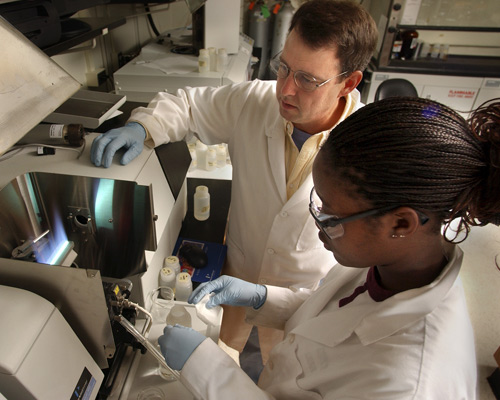Teokor Quarcoo ‘04 (Accra, Ghana) presented her research on chemical-free water treatment last month at the American Institute of Chemical Engineers Annual Meeting in San Francisco.
Working alongside an interdisciplinary team of faculty, she researched the effects of magnetic fields in the treatment of synthetic wastewater streams. Studies show that the presence of magnetic fields in an ion exchange can alter characteristics. For this project, however, a medium without ion exchange materials was used to see if the alteration would still affect the outcome.
Quarcoo, a chemical engineering major, worked as an EXCEL Scholar with Arthur D. Kney, assistant professor of civil and environmental engineering; Javad Tavakoli, associate professor of chemical engineering; and Andrew Dougherty, associate professor of physics.
In Lafayette’s distinctive EXCEL Scholars program, students assist faculty with research while earning a stipend. Lafayette is a national leader in undergraduate research. Many of the 180 students who participate in EXCEL each year go on to publish papers in scholarly journals and/or present their research at conferences.
The research was part of a Lafayette study of magnetic water conditioning, an environmentally friendly technology for treating industrial wastewater, which received support from a National Science Foundation grant last year. Kney continued his groundbreaking research in this area during the past fall semester at the School of Water Sciences at Cranfield University in England, where he developed plans for a relationship between Lafayette and Cranfield that will enhance research and teaching at both schools.
Quarcoo was responsible for running the EXCEL experiment by testing the solutions and analyzing the data produced. She prepared to undertake the project by learning how to use specialized lab equipment, then conducting an initial experiment and completing analytical work needed to begin the study. After the study was finished, she helped to compile the results.
“We found that the magnet did not have an effect on the ion-exchanging capabilities of strong acid ion exchange material used. That is, the breakthrough curves were similar whether or not a magnet was used,” she explains.
Quarcoo says the experience introduced her to challenges associated with research and provided her with laboratory skills that she will use in a career as a chemical engineer. It also allowed her to apply knowledge gained in her coursework.
“Although the classes themselves are very demanding, it is always rewarding to combine classes and research,” she says.
Kney notes, “We are confident that the skills Teokor acquired throughout [the project] will help to mold her abilities and instill a confidence that can only be gained by performing actual research.”
Quarcoo says that she learned a lot by working with Kney.
“Dr. Kney is a very knowledgeable person and he delights in imparting that knowledge,” she explains. “He is very open, so I could ask him many questions about my work and get help.”
Kney also found working with Quarcoo enjoyable.
“Teokor has a great spirit and when given a task, [she] carries it out very well,” he says. “I have enjoyed my time with Teokor in continuing our research relationship.”
Quarcoo is a member of the student chapter of the American Institute of Chemical Engineers, the Tau Beta Pi engineering honor society, International Students Association, Lafayette African and Caribbean Students Association, and Lafayette Christian Fellowship. She also is a resident adviser and a head facilities supervisor at Kirby Sports Center.
In addition, she has also been involved in two other EXCEL Scholars programs, both of which also helped prepare Quarcoo for a future in the chemical engineering field.
Lafayette has gained national recognition for its success in attracting and retaining outstanding women engineering students like Quarcoo. Last year, women earned about 31% of the bachelor’s degrees the College awarded in engineering. Nationally women make up approximately 19% of engineering B.S. graduates, according to a 2002 National Science Foundation report.
The American Society for Engineering Education has cited Lafayette among nine engineering schools nationwide that have “excelled in upping the ranks of women in their midst.” The other schools are Michigan State, Notre Dame, Northwestern, Purdue, Tufts, Tulane, and the universities of Colorado and Oklahoma. Lafayette received a grant of $151,875 from the National Science Foundation to build on this success and further strengthen recruitment and retention of both women and minority engineering students.
The opportunity to conduct meaningful research with faculty is a major advantage for these students. As a national leader in undergraduate research, Lafayette sends one of the largest contingents to the National Conference on Undergraduate Research each year. Over the past five years, more than 130 Lafayette students have presented results from research conducted with faculty mentors, or under their guidance, at the conference.
Lafayette ranks No. 1 among all U.S. colleges that grant only bachelor’s degrees in the number of graduates who went on to earn doctorates in engineering between 1920-1995, according to the Franklin and Marshall College study “Baccalaureate Origins of Doctoral Recipients.”

A National Leader in Undergraduate Research. Naa Quarcoo ’04 presented her collaborative research with Arthur Kney, asst. professor of civil and environmental engineering, at the American Institute of Chemical Engineers’ national meeting.
